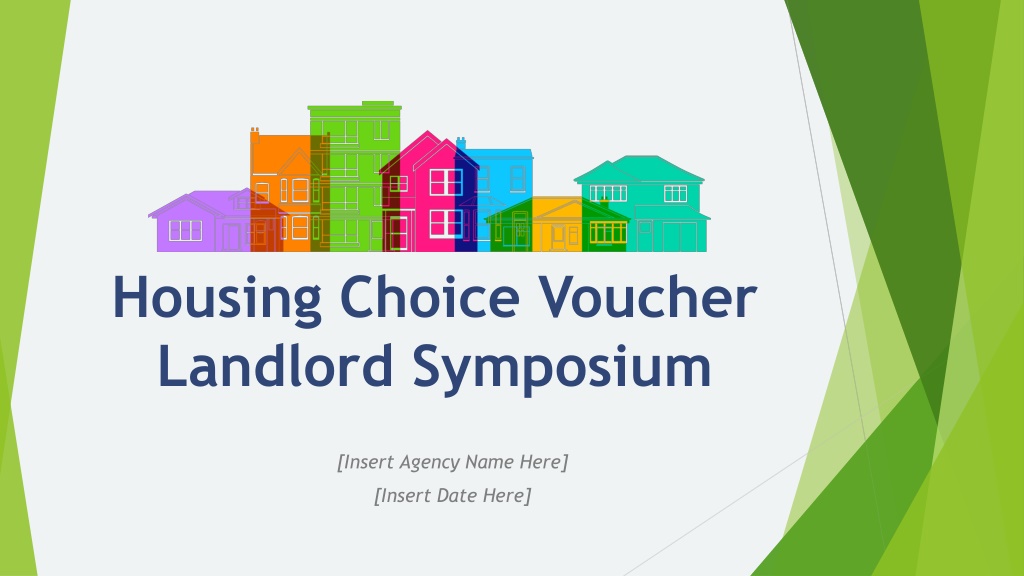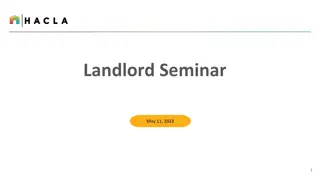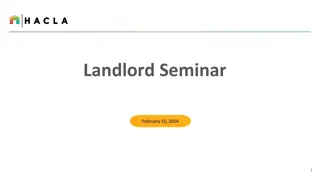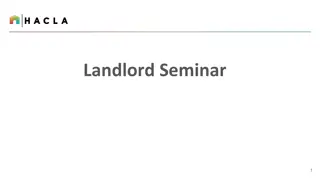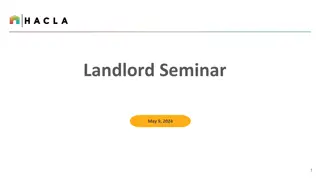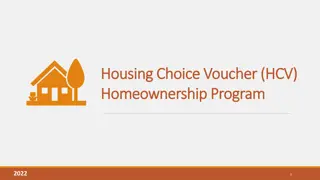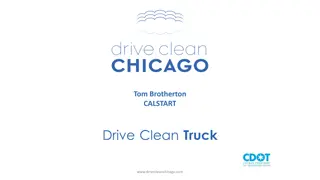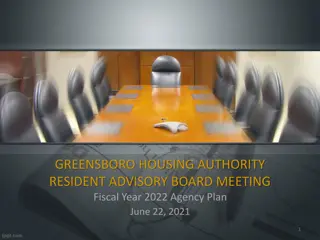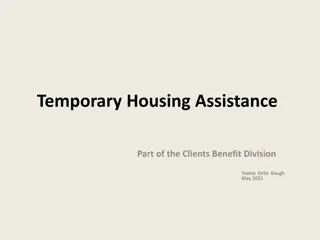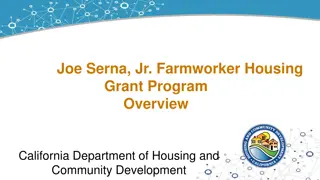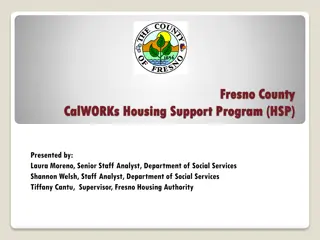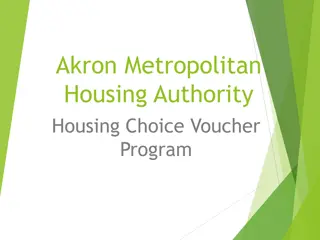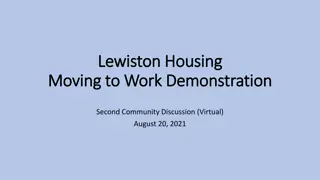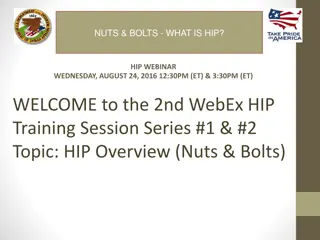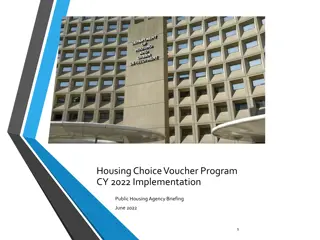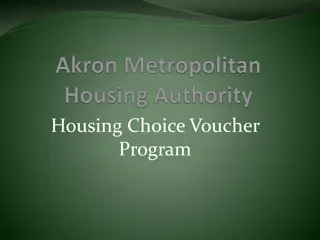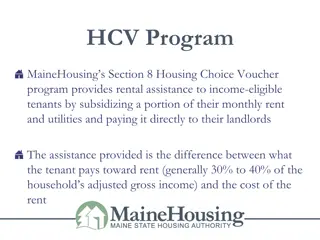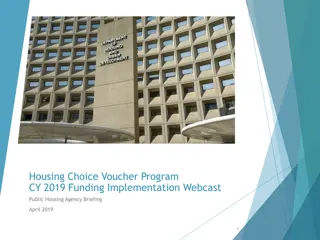Housing Choice Voucher Program Overview Symposium
This symposium focuses on the Housing Choice Voucher (HCV) program, highlighting its benefits for low-income families. It covers program basics, landlord roles, rental assistance details, and ways to participate effectively. The event also features sessions on program updates, special purpose vouchers, and a panel discussion for audience engagement.
Download Presentation

Please find below an Image/Link to download the presentation.
The content on the website is provided AS IS for your information and personal use only. It may not be sold, licensed, or shared on other websites without obtaining consent from the author. Download presentation by click this link. If you encounter any issues during the download, it is possible that the publisher has removed the file from their server.
E N D
Presentation Transcript
Housing Choice Voucher Landlord Symposium [Insert Agency Name Here] [Insert Date Here]
Housekeeping Technical Questions: HCV Questions for the Presenters Any additional thoughts or questions can be submitted anytime to: _________
Welcome Name Executive Director (or other senior staff) Agency Name
Agenda Session One: Housing Choice Voucher Program Overview Session Two: Program Updates Session Three: Headline Topic and/or Panel Discussion Q&A
[Insert Your PHA Here] Housing Choice Voucher (HCV) Program Overview [Insert Presenter's Name Here] [Insert Presenter's Title Here]
Housing Choice Voucher Program Overview Introduction HCV Locally Waiting List Program Basics, Benefits, and Ways to Participate Landlords are Key to Success Program Roles Rent to Landlord HAP Contract & Lease Tenancy Addendum Inspections Special Purpose Vouchers
Housing Choice Voucher (HCV) Program Introduction HCV is the Federal Government s major program for assisting low- income families, which may include elderly individuals or people with disabilities, to afford decent, safe and sanitary housing in the private market. PHAs receive funding from the federal government to administer the HCV Program locally and help low-income families afford rent Participant s receive rental assistance from their PHA but find housing units in the rental market that meets their needs In other words, the rental assistance is provided on behalf of the participant directly to the landlord
HCV Locally Provides rental assistance to more than 2 million low-income households nationwide and [X] number in our [state, city, locality]. [Insert Your PHA Here] provides rental assistance to [X number] of low-income households in [define jurisdiction].
HCV Waiting List Those interested in participating in HUD s HCV program apply through their local housing authority. The public housing authority (PHA) maintains a waiting list and offers vouchers as they become available. How does an individual or family receive assistance in the Housing Choice Voucher program? Applicants must be low-income to be eligible. Each PHA has the discretion to establish local preferences to reflect local needs and priorities. Families who qualify for any such local preferences may be offered a voucher ahead of others that do not qualify for preferences. When applicants are selected, they are interviewed to determine if they meet eligibility requirements.
HCV Program: Basics, Benefits, and Ways to Participate Click here to watch the HCV Program: Basics, Benefits, and Ways to Participate Video on YouTube: https://www.youtube.com/watch?v=M6n9bwwMH30
HCV Benefits for Participants HCV provides low-income families a rental subsidy Voucher holders pay 30-40% of their monthly income towards rent Voucher holders choose where they want to live Voucher holders choose what type of property they want to rent If a participant s income decreases their portion of rent will also decrease while the rental subsidy increases, so the total rent remains the same If a participant s income increases to the point where the rental subsidy is zero, they can remain on the program for 180 days
HCV Benefits for Landlords Landlords of all types can benefit from participating in the HCV Program Provides another opportunity for landlords to find prospective tenants Apply the same screening criteria as they would for any other applicant HCV tenants tend to be stable and long-term tenants stay in the same property on average 8-9 years The PHA sends the subsidy payment directly to the landlord every single month Periodic inspections can help identify maintenance needs early on
What is a Voucher? A voucher is a written contract between the Housing Authority and family describing program requirements and confirms family s eligibility for rental assistance Vouchers expires after 120 days if a family does not select a unit Lists the bedroom size the PHA has determined suits their family composition Can be adjusted in size if the family s household composition changes
Sample Voucher
Leasing a Unit Family selects a unit, completes RFTA paperwork with landlord (Request for Tenancy Approval) PHA reviews RFTA, determines if the rent is reasonableness and affordable for the family PHA inspects the rental unit using HUD established physical inspection standards called Housing Quality Standards (HQS) HQS set minimum criteria for the health and safety of program participants Family & landlord sign a lease, PHA & landlord sign a HAP Contract Family moves in and pays their portion of the rent, PHA pays subsidy to landlord
HAP Contract and Landlord Lease Housing Assistance Payment (HAP) Contract between the PHA and landlord May not be modified Governs housing assistance payment Includes required tenancy addendum Landlord Lease between tenant and landlord Enforced by landlord Tenancy addendum becomes part of landlord lease
HAP Contract The Housing Assistance Payments Contract is an agreement between the Landlord and the Housing Authority. Key details of the lease are reflected in the HAP Contract.
Tenancy Addendum The Tenancy Addendum is a standard HUD form that is attached to the Lease between the Landlord and the Tenant which details the program rules.
Inspections An Inspector will conduct an Inspection to ensure that HUD inspection standards are met. All housing units with HCV Tenants must meet the following thirteen (13) HQS Performance requirements* Sanitary facilities Food Preparation and refuse disposal Space and security Thermal Environment Illumination and electricity Interior air quality Water Supply Lead-based pain Site and neighborhood Sanitary Conditions Structure and materials Smoke detectors *HUD is currently piloting new inspection standards called NSPIRE. The NSPIRE model prioritizes health, safety and functional defects over appearance. If implemented, the earliest these standards would be used is late 2023.
Special Purpose Vouchers HUD funds HCV assistance to serve special populations including: Veterans (HUD-VASH vouchers) Youth aging out of foster care (FUP or FYI vouchers) Non-elderly disabled (Mainstream voucher) Victims of natural disasters and domestic violence
Housing Authority Contacts (1 of 2) PHA Name Contact
Where to learn more HUD s Landlord Page: https://www.hud.gov/program_offices/public_indian_housing/ programs/hcv/landlord HUD Exchange Landlord Page: https://www.hudexchange.info/programs/public-housing/hcv- landlord-resources/ Housing Choice Voucher Fact Sheet: https://files.hudexchange.info/resources/documents/PIH-HCV- Landlord-Fact-Sheet.pdf
[Insert Your PHA Here] Housing Choice Voucher (HCV) Program: Program Updates [Insert Presenter's Name Here] [Insert Presenter's Title Here]
Staffing Changes Insert staffing changes here.
Procedure updates Insert procedure updates here.
Policy Changes Insert policy changes here.
Local, State, National Policy Updates Insert local, state, and national policy updates here.
Housing Authority Contacts (2 of 2) PHA Name Contact
[Insert Your PHA Here] Housing Choice Voucher (HCV) Program: Insert Headline Topic Here [Insert Presenter's Name Here] [Insert Presenter's Title Here]
Headline Topic Content The headline topic of your symposium is what will likely draw landlord participation. As such, it should be timely and relevant to landlords in your community. The following slides provide sample headline topics. When designing your own topic, it is recommended that, at a minimum, you include information that covers the following: Background How this benefits the landlord How this benefits the Housing Authority Summary and opportunity for questions
[Insert Your PHA Here] Housing Choice Voucher (HCV) Program: Landlord-Tenant Law [Insert Presenter's Name Here] [Insert Presenter's Title Here]
Landlord-Tenant Law Landlord-tenant laws govern the relationship between a landlord and a tenant in a residential setting. Landlord-tenant laws usually regulate issues concerning rental property, which include the obligations of a tenant and a landlord, and terms of the lease including issuing of notices and security deposits. Landlord-tenant laws are contained in the state laws and they may also be included in local ordinances. In cases where there are both, the most restrictive applies. For our jurisdiction, you can find the applicable Landlord-tenant laws here: State Law: [Insert web address here] Local/City Law: [Insert web address here]
Landlord-Tenant Law Panel Landlord-tenant laws provide protections to both the landlord and the tenant. As such, our panel includes a representative from a landlord association and a representative from a tenant s rights organization to provide a holistic picture of the law. insert name here insert name of rental association here insert name here insert tenant-rights organization here insert name here insert landlord-tenant law firm here insert picture here insert picture here insert picture here
Rental Association The Rental Association is a [insertdescription of association here]. I will provide information today on some things you, as a landlord, should know regarding landlord-tenant law. [not an attorney disclosure, if appropriate] I will discuss the following areas covered in our landlord-tenant law: Security Deposits & Fees Rent and other charges Tenant Obligations
Security Deposits & Fees A security deposit is intended to reimburse for tenant caused damages beyond normal wear and tear, or unpaid rent. A security deposit must be refundable if conditions are met. Some of the things that might be specified in the law include [customize this section for your jurisdiction]: Limits on the amount of security deposit collected Type of documentation necessary to retain security deposit How much time a landlord has to return remaining security deposit What types of things can be deducted from a Security Deposit In contrast to a security deposit, fees are often not refundable. An example of this would include a cleaning fee charged at the beginning of the lease to cover the costs of cleaning when a tenant moves out.
Rent and other charges Rent: The law in your jurisdiction may regulate issues concerning rent. This may include [adapt for your jurisdiction]: Rent control Rent increases Amount of notice for rent Other charges typically include items that are separate from the rent and may or may not be optional. Examples of this include may include [adapt for your jurisdiction]: Parking Landlord provided appliances Pet charges
Tenant Obligations Some tenant obligations will be covered in the law, if not prohibited in the law, you may add other obligations in your lease. [adapt for your jurisdiction]: Keep the unit in a sanitary condition Comply with housing and health codes Do not damage or destroy the unit Pay utility costs not provided for by the landlord other
Tenants Rights Organization The Tenant s Rights Organization is a [description of organization]. I will provide information today on some things you, as a landlord, should know regarding landlord-tenant law. [not an attorney disclosure, if appropriate] I will discuss the following areas covered in our landlord-tenant law: Landlord Obligations Termination of Rental Agreement
Landlord Obligations Landlord obligations will be covered in the law. Some of these may include [customize this section for your jurisdiction]: Provide safe, habitable and clean rental unit to the tenant Maintain shared areas of a rental property Comply with housing and health codes Provide notice before entering the property Pay owner supplied utility charges Maintain owner supplied appliances
Termination of Rental Agreement Your lease will specify when your rental agreement terminates, however the law may cover areas when a rental agreement could terminate automatically such as [adapt for your jurisdiction]: When a tenant abandons the unit and ceases to pay rent When a tenant continues to occupy a unit after a rental agreement expires
Landlord-tenant Law Q & A More questions? [Insert Contact Name here] [Insert Phone Number here] [Insert Email here]
[Insert Your PHA Here] Housing Choice Voucher (HCV) Program: Administrative Flexibilities [Insert Presenter's Name Here] [Insert Presenter's Title Here]
Inspection Flexibilities [Insert your PHA here] has implemented the following flexibilities to benefit the landlords in our program. Inspections: A family can move into a unit even if the initial inspection identifies minor deficiencies, as long as they are non-life threatening. This enables the tenant to move in more quickly and reduces vacancy days for the landlord. A family can move into a unit before the initial inspection occurs if the unit has passed inspection an alternative inspection in the prior 24 months. Landlords may submit photo verification that an inspection deficiency has been resolved. This reduces the amount of time for the unit to pass inspection. Periodic unit inspections may be conducted biennially rather than annually.
Additional Flexibilities We have implemented the following non-inspection flexibilities to meet the needs or our landlords: [Insert your PHA] here has implemented voucher payment standards that more closely mirror higher cost areas of the city. This provides voucher holders with greater housing choice by approving rents more closely aligned with the market. Coordination with partnering Housing Authorities. We have aligned our procedures, practices and forms with our neighboring Housing Authorities, which provides consistency to landlords who may have rental units in multiple jurisdictions. This includes accepting the other PHA s forms, where similar Cross training staff to be able to answer basic questions across PHAs
How this benefits landlords Reduces delays in approving a voucher assisted tenancy. We know that the initial inspection process may create additional vacancy days that you would not encounter when renting to a non-voucher holder. The flexibilities we have implemented mitigate this difference between a voucher holder and non- voucher holder. Periodic inspections are important and benefit the landlord as well as the tenant. However, we reduced the frequency of these inspections as we recognize that coordinating inspections of your rental properties with the Housing Authorities every single year can be a time burden.
Additional benefits Higher voucher payment standards in higher cost areas enables landlords to rent to voucher holders without accepting a lower rent than they would have otherwise received. Coordinating administrative processes across neighboring Housing Authorities provides consistency for landlords when they have properties under multiple Housing Authorities. This coordination includes cross-training housing authority staff to be able to answer basic questions you may have or to refer you to the appropriate person at the appropriate housing authority.
How this benefits the Housing Authority The Housing Choice Voucher Program is successful because of the partnerships we make with landlords. Our focus on customer service and effective partnerships means that we listen to your needs and make adjustments where we can. Many of these flexibilities also creates time savings which are used to provide better service delivery across all areas. By implementing these flexibilities, we hone our value of continually improving our programs.
COVID Flexibilities During the COVID-19 Pandemic, the following flexibilities were authorized in order to enable program operations to continue as much as possible: Drop-boxes - Drop-boxes facilitate delivery of documents to PHA during pandemic. Phone - Many PHA staff remain teleworking, phone lines have remained open. Email - Email communication is also being used to collect supporting documentation, and to communicate with applicants and participants. Phone/video conferencing used to assess eligibility and reexam meetings
